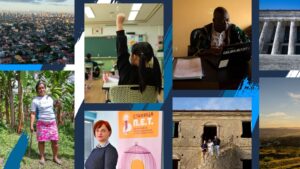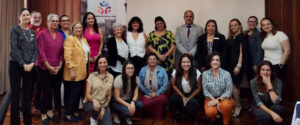Improving Gender Disparities through Open Government Approaches in Costa Rica
Mejorando las desigualdades de género mediante enfoques de gobierno abierto en Costa Rica
In Costa Rica, technology-facilitated gender-based violenceReforms that combat gender-based violence are essential for fostering an inclusive society and government that respects human rights and promotes gender equality. Technical specifications: Commitments... More (TFGBV), violence against women in politics and gendered gaps in public policies and automated decision-makingAs governments are increasingly turning to algorithms to support decision-making for public services, transparency and accountability of algorithm use is necessary to minimize their harm and increase ... More (ADM) systems are urgent challenges to democracy. GenderOGP participating governments are bringing gender perspectives to popular policy areas, ensuring diversity in participatory processes, and specifically targeting gender gaps in policies to address gov... More disparities undermine inclusive representation, weaken institutional legitimacy, and limit citizens’ equal ability to participate fully in public life.
To improve this reality for women, at ACCESA, we have developed people-centered solutions to create a more equitable and democratic society with the support of the International Development Research Centre’s FOGO mini grant. Our work includes three projects—a proposal for an inter-institutional protocol to address VDFTD, a study to analyze and propose recommendations to tackle violence against women in politics and a gendered assessment on public policies and the use of artificial intelligence (AI) and SDA systems.
Addressing TFGBV
TFGBV refers to the gender-based harms enabled by technology, including online harassment, sharing private images without consent, which create unsafe digital spaces for women and gender minorities. Globally, young women aged 18–24 are particularly impacted, with over half experiencing online violence.
Combating TFGBV poses two problems in Costa Rica: the absence of existing national frameworks and the difficulty of integrating survivors’ voices without causing re-victimization.
Through the mini-grant, we developed a proposal for an inter-institutional protocol to address TFGBV. Despite the challenges, we committed to a victim-centered design process, consulting public officials, women’s organizations, activists, and academia.
The result was the region’s first practical guide for reporting, receiving, and handling TFGBV cases that prioritizes clear steps for informing victims, providing psychological care, offering social support, and ensuring legal guidance to file a formal complaint.
Research on Violence against Women in Politics
Women in politics and leadership continue to face political violence such as defamation, intimidation, and unequal access to leadership. UN Women offered a stark warning in June 2025: if the world continues at its current pace, it will take 130 years to achieve gender equality in the world’s decision-making bodies.
Despite Costa Rica’s recent legislative advances to prevent, punish, and eradicate violence against women in politics,women continue to face verbal harassment, online attacks, and structural barriers designed to deter their political participation.
Through the grant, we conducted a study to provide up-to-date data on female political violence, why incidents weren’t reported, the role of technology, and the impacts on victims’ professional and personal lives. This research shows that 78 percent of women in politics and leadership positions interviewed said that they experienced political gender-based violence. However, 65 percent said that they did not report these incidents.
Building on the findings, the study also included recommendations for effective prevention and response, aimed at fostering safer political environments for women. For example, we propose three actions:
- Expand accessible training in leadership, negotiation, and political participation, especially for underrepresented groups.
- Create mentoring and support networks with legal and psychological services for victims.
- Build clear indicators to ensure effective implementation of the law and adoption of internal regulations by political parties and local governments.
Assessment on Gender Biases in Public Policy
Public policies often fail to embed gender analysis, act to address cultural stereotypes, and have weak monitoring systems. Public institutions are also increasingly relying on ADM systems and AI to allocate resources, benefits, or services. For these reasons, it is essential that we examine gender biases in public policies and challenge the idea that decisions made by algorithms or automated systems are unbiased.
To fill this gap, we launched a gendered assessment on public policies and ADM systems—the first of its kind in Costa Rica. Our analysis found that while most policies reviewed include sex-disaggregated data (86 percent) and nearly all recognize differences between genders in their assessments (93 percent), only 57 percent go further to explore the unique needs and experiences of different groups of women. None of the policies fully identified the barriers women face or offered clear strategies to address them. These gaps risk being replicated by automated systems that rely on biased policy data.
As a result, our assessment calls for a more integrated, gender-sensitive approach in policies and ADM systems to ensure that new technologies actively promote equity rather than reinforce discrimination. This includes applying gender-sensitive evaluation instruments, ensuring algorithm transparencyAccording to OGP’s Articles of Governance, transparency occurs when “government-held information (including on activities and decisions) is open, comprehensive, timely, freely available to the pub... More, using diverse and representative data to reduce bias, establishing standards and accountability mechanisms, providing training on gender equality for developers and policy-makers, and ensuring meaningful inclusionOGP participating governments are working to create governments that truly serve all people. Commitments in this area may address persons with disabilities, women and girls, lesbian, gay, bisexual, tr... More of women and gender minorities in all phases of design, implementation, and evaluation.
The Importance of a Gendered Lens of Government
Throughout the project, we faced significant challenges: a lack of local examples to guide us, limited available information, victims’ fear of participating, and the need to adapt complex tools to local realities. Nonetheless, we confirmed that open government provides a transformative framework to address these issues. Co-creation with diverse stakeholders, public consultation to encourage citizen participationAccording to OGP’s Articles of Governance, citizen participation occurs when “governments seek to mobilize citizens to engage in public debate, provide input, and make contributions that lead to m... More, and the development of tools for transparency and accountability were key to our progress.
Above all, we reaffirmed that a gender lens must be a cross-cutting priority across public policy. This means directly including women’s voices, recognizing all forms of diversity, and building institutions sensitive to digital realities and the disproportionate impacts faced by women and gender minorities.
Ultimately, we produced concrete outputs for dissemination and implementation while prioritizing openness, participation, and inclusion to help build more just, equitable, and responsive institutions capable of meeting democracy’s urgent challenges. Our work reaffirms the importance of collaboration, adaptability, and the commitmentOGP commitments are promises for reform co-created by governments and civil society and submitted as part of an action plan. Commitments typically include a description of the problem, concrete action... of civil society organizations like ACCESA in building more democratic, open, and inclusive societies.
ACCESA is a Costa Rican civil society organization, member of the National Commission of Open State (Costa Rica’s OGP Multi-Stakeholder ForumRegular dialogue between government and civil society is a core element of OGP participation. It builds trust, promotes joint problem-solving, and empowers civil society to influence the design, imple...), and an expert in open government and co-creation processes. Its main goal is to foster the development of an open, democratic, inclusive, and diverse society by promoting transparency, accountability, access to public interest information, and citizen participation.
En Costa Rica, la violencia de género facilitada por la tecnologías digitales (VGFTD), la violencia contra las mujeres en la política y las brechas de género en las políticas públicas y en los sistemas de toma de decisiones automatizadas (STDA) son desafíos urgentes para la democracia. Las desigualdades de género socavan la representación inclusiva, debilitan la legitimidad institucional y limitan la capacidad de la ciudadanía para participar de manera plena e igualitaria en la vida pública.
Para mejorar esta realidad para las mujeres, en ACCESA hemos desarrollado soluciones centradas en las personas para construir una sociedad más equitativa y democrática, con el apoyo del FOGO mini grant del Centro Internacional de Investigaciones para el Desarrollo. Nuestro trabajo incluye tres proyectos: una propuesta de protocolo interinstitucional para abordar la VDFTD, un estudio para analizar y proponer recomendaciones contra la violencia hacia las mujeres en la política y una evaluación con perspectiva de género sobre políticas públicas y el uso de sistemas STDA e inteligencia artificial (IA).
Abordar la VDFTD
La VDFTD se refiere a las formas de violencia de género facilitadas por la tecnología, como el acoso en línea, la difusión de imágenes privadas sin consentimiento que generan espacios digitales inseguros para mujeres y minorías de género. A nivel global, las mujeres jóvenes de 18 a 24 años son especialmente afectadas, con más de la mitad experimentando violencia en línea.
Combatir la VDFTD en Costa Rica enfrenta dos problemas: la ausencia de marcos nacionales existentes y la dificultad de integrar las voces de las sobrevivientes sin provocar su revictimización.
Gracias al mini-grant, desarrollamos una propuesta de protocolo interinstitucional para abordar la VDFTD. A pesar de los desafíos, nos comprometimos con un proceso de diseño centrado en la víctima, consultando a personas funcionarias públicas vinculadas, organizaciones de mujeres, activistas y al sector académico.
El resultado fue la primera guía práctica de la región para denunciar, recibir y atender casos de VDFTD, que prioriza pasos claros para informar a las víctimas, brindar atención psicológica, ofrecer apoyo social y garantizar asesoría legal para interponer una denuncia formal.
Investigación sobre violencia contra las mujeres en la política
Las mujeres en política y en roles de liderazgo siguen enfrentando violencia política, como difamación, intimidación y acceso desigual a posiciones de liderazgo por su condición de género. ONU Mujeres advirtió con firmeza en junio de 2025: si el mundo sigue al ritmo actual, tomará 130 años alcanzar la igualdad de género en los órganos de toma de decisiones.
A pesar de los recientes avances legislativos en Costa Rica para prevenir, sancionar y erradicar la violencia contra las mujeres en la política, se continúa sufriendo acoso verbal, ataques en línea y barreras estructurales diseñadas para desalentar su participación política.
Con el apoyo del mini grant, realizamos un estudio para generar datos actualizados sobre la violencia política hacia las mujeres, las razones por las que no se denunciaron los incidentes, el papel de la tecnología y los impactos en la vida profesional y personal de las víctimas. Esta investigación muestra que el 78 % de las mujeres en política y cargos de liderazgo entrevistadas dijeron haber experimentado violencia política de género. Sin embargo, el 65 % reconoció que no denunció los incidentes.
A partir de estos hallazgos, el estudio incluyó recomendaciones para una prevención y respuesta efectivas, orientadas a fomentar entornos políticos más seguros para las mujeres. Por ejemplo, proponemos tres acciones:
- Ampliar las formaciones accesibles en liderazgo, negociación y participación política, especialmente para grupos subrepresentados.
- Crear redes de mentoría y apoyo con servicios legales y psicológicos para las víctimas.
- Construir indicadores claros para garantizar la implementación efectiva de la ley y la adopción de regulaciones internas por parte de los partidos políticos y gobiernos locales.
Evaluación de sesgos de género en políticas públicas y sistemas STDA
Con frecuencia, las políticas públicas carecen de un enfoque de género, no abordan los estereotipos culturales y tienen sistemas de monitoreo débiles. Además, las instituciones públicas dependen cada vez más de los sistemas STDA e IA para asignar recursos, beneficios o servicios. Por ello, es esencial examinar los sesgos de género en las políticas públicas y cuestionar la idea de que las decisiones tomadas por algoritmos o sistemas automatizados son imparciales.
Para llenar este vacío, lanzamos un instrumento para evaluar la perspectiva de género de las políticas públicas y sistemas STDA en Costa Rica. Nuestro análisis encontró que, si bien la mayoría de las políticas revisadas incluye datos desagregados por sexo (86 %) y casi todas reconocen diferencias entre géneros en sus diagnósticos (93 %), solo el 57 % profundiza en las necesidades y experiencias únicas de distintos grupos de mujeres. Ninguna de las políticas identificó completamente las barreras que enfrentan las mujeres ni ofreció estrategias claras para abordarlas. Estas brechas corren el riesgo de ser replicadas por sistemas automatizados que se basan en datos de políticas sesgados.
Como resultado, nuestra evaluación llama a un enfoque más integrado y sensible al género en las políticas y los sistemas STDA para garantizar que las nuevas tecnologías promuevan activamente la equidad en lugar de reforzar la discriminación. Esto incluye aplicar instrumentos de evaluación con enfoque de género, garantizar la transparencia algorítmica, usar datos diversos y representativos para reducir sesgos, establecer estándares y mecanismos de rendición de cuentas, brindar formación sobre igualdad de género a quienes desarrollan y gestionan políticas y sistemas, y asegurar la inclusión significativa de mujeres y minorías de género en todas las fases de diseño, implementación y evaluación.
La importancia de una perspectiva de género en el gobierno
A lo largo del proyecto enfrentamos desafíos importantes: falta de ejemplos locales que nos sirvieran de guía, disposición de información limitada, temor de las víctimas a participar y la necesidad de adaptar herramientas complejas a las realidades locales. Sin embargo, confirmamos que el gobierno abierto ofrece un marco transformador para abordar estos problemas. La cocreación con actores diversos, la consulta pública para fomentar la participación ciudadana y el desarrollo de herramientas para la transparencia y la rendición de cuentas fueron clave para nuestro avance.
Sobre todo, reafirmamos que la perspectiva de género debe ser una prioridad transversal en la política pública. Esto implica incluir directamente las voces de las mujeres, reconocer todas las formas de diversidad y construir instituciones sensibles a las realidades digitales y a los impactos desproporcionados que enfrentan las mujeres y minorías de género.
En última instancia, generamos productos concretos para su difusión e implementación, priorizando la apertura, la participación y la inclusión para contribuir a la construcción de instituciones más justas, equitativas y receptivas, capaces de enfrentar los desafíos urgentes de la democracia. Nuestro trabajo reafirma la importancia de la colaboración, la adaptabilidad y el compromiso de organizaciones de la sociedad civil como ACCESA en la construcción de sociedades más democráticas, abiertas e inclusivas.
ACCESA es una organización de la sociedad civil costarricense, miembro de la Comisión Nacional de Estado Abierto (Foro Multiactor de OGP en Costa Rica) y experta en gobierno abierto y procesos de cocreación. Su objetivo principal es fomentar el desarrollo de una sociedad abierta, democrática, inclusiva y diversa mediante la promoción de la transparencia, la rendición de cuentas, el acceso a la información de interés público y la participación ciudadana.
No comments yet
Related Content
 Champions
Champions Faces of Open Government: Daniela Chacón-Mendoza
In this interview, marking the International Day for the Elimination of Violence against Women, Daniela Chacón-Mendoza discusses the critical role digital platforms play in combating gender-based violence in politics.
 Impact
Impact Five Feminist Lessons from a Super-Election Year
Five action research projects funded by the International Development Research Centre’s (IDRC) Feminist Open Government Initiative show that progress in gender and inclusion is possible when local coalitions have the…

Open Gov Guide
The Open Gov Guide is the go-to resource for officials, civil society representatives, and other actors looking for recommendations, examples, and resources on open government.


Leave a Reply